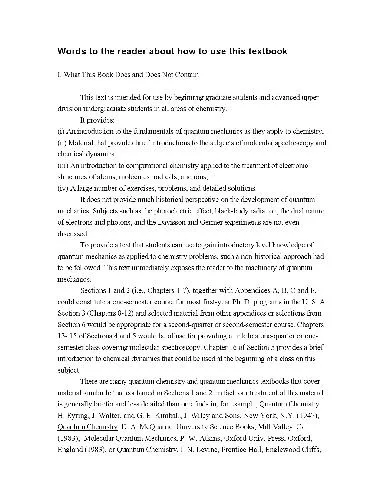Ergonomics and Psychology: Developments in Theory and Practice (Ergonomics Design and Management : Theory and Applications)
4.5
Reviews from our users

You Can Ask your questions from this book's AI after Login
Each download or ask from book AI costs 2 points. To earn more free points, please visit the Points Guide Page and complete some valuable actions.Related Refrences:
Introduction to "Ergonomics and Psychology: Developments in Theory and Practice"
"Ergonomics and Psychology: Developments in Theory and Practice" provides a comprehensive exploration of the intersection between ergonomics and psychology, offering a distinctive viewpoint on how these two disciplines intertwine to improve human performance, safety, and overall well-being. Written by experts Olexiy Ya Chebykin, Gregory Z. Bedny, and Waldemar Karwowski, this book provides both theoretical depth and practical insights for professionals, researchers, and students in the fields of human factors, psychology, and design.
In an era of rapidly evolving technology and workplace demands, understanding the cognitive and psychological aspects of human interaction with tools, environments, and systems is paramount. This book delves deeply into the application of systems theory, activity theory, and cognitive ergonomics to resolve practical challenges in modern ergonomics and workplace design. By combining traditional concepts with contemporary trends, the authors emphasize how psychological principles are critical to designing systems, spaces, and technologies that enhance user experience, productivity, and safety.
The book serves as a bridge between academic research and practical applications, making it an essential addition to the toolkit of anyone involved in human factors design, occupational health, or organizational psychology. Below, we provide a detailed summary, highlight the key takeaways, share some notable quotes, and discuss why this work is so impactful.
Detailed Summary of the Book
This book is divided into several chapters that systematically explore the interplay between ergonomics and psychology. It begins by outlining the fundamental principles of both disciplines, providing readers with a strong foundational knowledge. The authors emphasize the importance of a systematic, activity theory-based approach that views human work as a purposeful, dynamic interaction with tools and systems.
One of the core themes is cognitive ergonomics, which focuses on mental workload, decision-making, and information processing in complex systems. The book provides numerous case studies and empirical research to illustrate these concepts, showing how cognitive factors influence human behavior in workplaces, healthcare settings, and other critical environments.
Another major focus is on practical applications, including strategies for designing ergonomic systems that account for psychological factors such as stress, fatigue, and motivation. The authors emphasize the importance of adaptability in system design, ensuring that systems are not only efficient but also sustainable for human use over the long term.
The volume also addresses emerging challenges in digital environments and automation, discussing how psychological theories can guide the integration of artificial intelligence (AI) and robotics into workplace design. In doing so, the book provides cutting-edge insights into the future of ergonomics and psychology.
Key Takeaways
- The integration of activity theory and systems theory is essential for modern ergonomics.
- Cognitive ergonomics plays a critical role in understanding mental workload, decision-making, and system usability.
- Human-centered design must consider psychological factors such as stress, adaptability, and motivation.
- The growing influence of AI and robotics presents unique challenges and opportunities for ergonomics research.
- Practical applications of ergonomic systems can significantly enhance safety, productivity, and user satisfaction across industries.
Famous Quotes from the Book
"Ergonomics is not merely about comfort or efficiency—it is about creating a harmonious interaction between humans and their environments."
"The human mind is the most sophisticated system of all, and understanding its complexities unlocks the potential for better design and innovation."
Why This Book Matters
As industries become increasingly technology-driven and reliant on automation, the need for systems that prioritize human well-being has never been more critical. This book bridges the gap between theoretical research and real-world applications, offering readers a chance to understand the practical importance of cognitive and psychological ergonomics.
Whether you are a scholar exploring activity theory, a designer developing user-friendly systems, or a practitioner seeking actionable insights for improving workplace safety, this book offers valuable guidance. By addressing key challenges in healthcare, manufacturing, digital design, and more, the authors ensure their work remains relevant across multiple fields.
Ultimately, "Ergonomics and Psychology: Developments in Theory and Practice" serves as a vital resource for individuals invested in the future of human-centered design and the meaningful integration of technology into our daily lives.
Free Direct Download
You Can Download this book after Login
Accessing books through legal platforms and public libraries not only supports the rights of authors and publishers but also contributes to the sustainability of reading culture. Before downloading, please take a moment to consider these options.
Find this book on other platforms:
WorldCat helps you find books in libraries worldwide.
See ratings, reviews, and discussions on Goodreads.
Find and buy rare or used books on AbeBooks.
1303
بازدید4.5
امتیاز0
نظر98%
رضایتReviews:
4.5
Based on 0 users review
Questions & Answers
Ask questions about this book or help others by answering
No questions yet. Be the first to ask!













